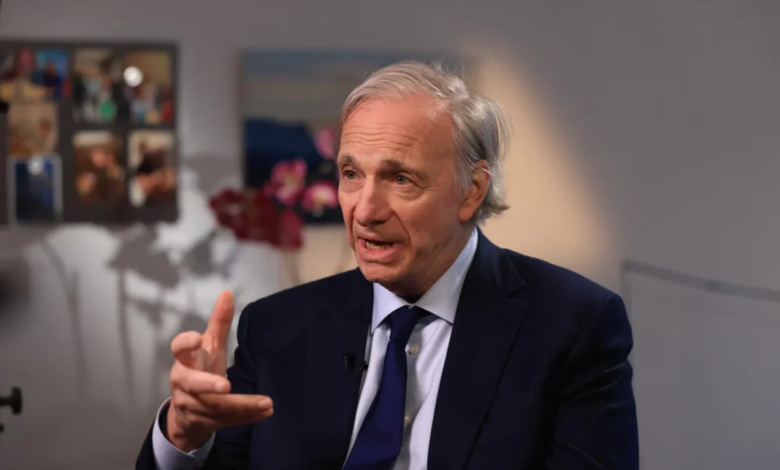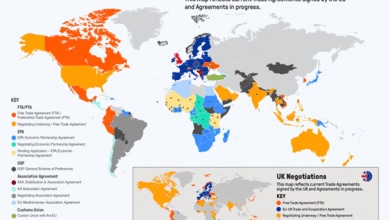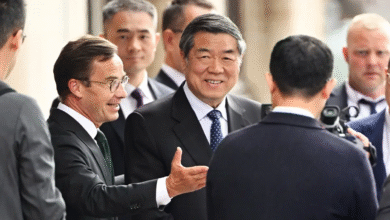Ray Dalio on Trump Tariffs: A Strategic Opportunity

Ray Dalio on Trump tariffs highlights a pivotal moment for U.S.-China trade relations, as billionaire investor Ray Dalio observes that President Trump’s recent decision to suspend country-specific tariffs opens the door for strategic reassessment. With tensions between the two largest economies ongoing, Dalio sees this pause as a chance for constructive negotiation over tariffs, emphasizing the importance of finding mutually beneficial solutions. The founder of Bridgewater Associates expressed optimism that Trump’s approach could lead to more effective strategies in addressing persistent trade imbalances and economic challenges. By stepping back from imposing 104% tariffs on Chinese imports, Dalio believes that the United States can foster a more favorable investment environment. His insights resonate with investors looking to navigate the complexities of global trade amidst evolving fiscal policies and negotiations.
In the context of trade dynamics, Ray Dalio’s perspective on the recent tariff negotiations under President Trump sheds light on potential pathways for improvement within international economic frameworks. The billionaire investor articulates a vision for enhanced dialogue between the U.S. and China, recognizing that thoughtful engagement can lead to favorable outcomes. Instead of resorting to sweeping tariffs, Dalio advocates for strategic discussions to alleviate trade tensions and foster stability. As fiscal debates around U.S. budget deficits persist, his insights serve as a timely reminder for stakeholders to reconsider their investment approaches in light of shifting policies and global economic interdependencies. With an eye on the future, Dalio’s emphasis on negotiation aligns closely with the need for sustainable trade practices.
Ray Dalio on Trump Tariffs: A Strategic Opportunity
Billionaire investor Ray Dalio has weighed in on the implications of President Donald Trump’s recent decision to suspend country-specific tariffs. In his view, this pause creates a valuable opportunity for all parties involved to rethink their economic strategies. Dalio believes that negotiation, rather than the imposition of high duties, offers a more viable route to achieving mutually beneficial trade relations, particularly in the context of U.S.-China dynamics. This perspective encourages stakeholders to reassess their tactics in light of evolving global economic realities.
Dalio’s insights reflect a growing sentiment among investors who are wary of the long-term effects of aggressive tariff policies. By steering away from a trade war, Trump’s administration can foster a climate that is more conducive to dialogue and collaboration. This transition from confrontation to negotiation may allow for more effective solutions that address trade imbalances, suggesting that there is indeed a path to reducing tension in U.S.-China trade relations without resorting to punitive tariffs.
The Impact of Trump’s Tariffs on Financial Markets
The announcement of a 90-day suspension of country-specific tariffs had an immediate positive effect on Wall Street, with stocks experiencing a surge as investors reacted to the potential for negotiation. This market behavior underscores the belief in the power of diplomacy over tariffs; investors see it as a signal that the economic landscape might stabilize if talks resume. A optimistic sentiment following such announcements often leads to increased investments, indicating a combined confidence in both domestic and international markets.
Ray Dalio suggests that this moment of calm could also lead investors to reassess their portfolios. With the potential for future risks still looming, particularly in the context of ongoing trade negotiations, adjusting investment strategies may be prudent. Dalio emphasizes that rather than merely riding the wave of temporary market highs, investors should consider structuring their assets in anticipation of volatility, enabling them to navigate through both favorable and adverse economic conditions.
Examining U.S.-China Trade Relations Amid Tariff Negotiations
U.S.-China trade relations have been characterized by a series of escalating tariffs that have led to significant economic uncertainty. As both nations grapple with the implications of their trade policies, Ray Dalio’s calls for negotiation highlight the potential for a de-escalation of tensions. By focusing on cooperative solutions rather than unilateral tariff actions, both countries could arrive at an agreement that promotes growth and stability in the region.
Furthermore, Dalio’s emphasis on the necessity for reforms regarding trade practices and monetary policies suggests a long-term strategy to rectify trade imbalances. Implementing collaborative measures can build trust and foster a healthier economic relationship. It is essential for policymakers to consider Dalio’s insights, as sustainable trade frameworks may ultimately contribute to not only better trade dealings but also to the broader global economic stability.
Ray Dalio’s Perspectives on Balanced Trade Strategies
Ray Dalio asserts that there are superior methods for tackling economic challenges, particularly regarding persistent trade deficits and unsustainable national debt. By stepping back from extreme measures like widespread tariffs, Dalio argues that the U.S. can pursue a balanced approach that prioritizes negotiation and compromise. This strategy aligns with his investment philosophy at Bridgewater Associates, which champions analysis and understanding over reactionary measures.
Dalio’s insights propose that achieving a balanced budget deficit is crucial in bolstering financial stability. As he suggests, targeting a reduction of the deficit to 3% of GDP represents a rational goal that can invigorate confidence in U.S. economic policies. Completing these reforms would require not just negotiation with trade partners like China, but a comprehensive strategy that encompasses fiscal discipline and innovative economic practices.
The Future of Investment Strategies in a Tariff-focused Economy
In a climate where tariffs heavily influence the investment landscape, Ray Dalio’s commentary encourages a reevaluation of strategies. Investors must account for evolving policies and their implications on trade relations, particularly the ongoing negotiations between the United States and China. As tariffs can designate winners and losers within the market, adopting a flexible and informed investment stance becomes increasingly important.
Dalio’s emphasis on risk management is particularly pertinent in this discussion. By understanding the potential for future market disruptions linked to tariff negotiations, investors can position themselves to weather economic storms effectively. This proactive approach can steer them away from impulsive investment decisions, fostering a climate of financial prudence that can lead to long-term success.
The Role of Bridgewater Associates in Understanding Trade Dynamics
Ray Dalio’s renowned investment firm, Bridgewater Associates, plays a critical role in interpreting and anticipating market movements influenced by trade dynamics. As a thought leader in economic analysis, Dalio leverages his experience to evaluate the ramifications of policy decisions, including tariffs and trade negotiations. This expertise positions Bridgewater as a critical player in guiding investors through periods of uncertainty, fostering a deeper understanding of how global trade relations can affect market performance.
Moreover, the insights provided by Bridgewater Associates can help investors align their strategies with macroeconomic trends. By focusing on data-driven analysis that incorporates various economic indicators and geopolitical events, investors can make more informed decisions. This analytical approach ensures that they remain ahead of potential disruptions in trade relations, allowing them to capitalize on opportunities as they arise while mitigating risks associated with sudden policy changes.
Assessing the Risks of Unilateral Tariff Actions
The reliance on unilateral tariff actions poses significant risks to both domestic and global economic landscapes. Ray Dalio has expressed concerns that broad tariffs may ultimately harm the very economy they are meant to protect. Instead of fostering a healthy trade balance, such measures can lead to retaliatory actions and economic instability, which would negatively impact U.S. consumers and businesses alike.
Dalio highlights that it is crucial for policymakers to consider the long-term consequences of their actions. A negotiation-centric approach could facilitate agreements that benefit all parties and promote sustainable economic growth. By prioritizing diplomacy over confrontation, the U.S. can establish more robust trade relations and reduce the risks associated with unilateral tariffs, potentially paving the way for a more harmonious global trading environment.
Preparing for Market Fluctuations with Strategic Investments
As market fluctuations become increasingly tied to political decisions regarding tariffs and trade negotiations, Ray Dalio’s guidance serves as a vital resource for investors. He urges the importance of preparing for volatility, particularly in light of the current complexities of U.S.-China trade relations. Strategic planning and responsive asset allocation are essential for navigating these uncertain waters.
Investors would benefit from reassessing their portfolios to ensure alignment with potential economic scenarios that may unfold due to tariff negotiations. Instead of taking a reactionary stance, Dalio advocates for a proactive investment strategy that anticipates market shifts, emphasizing the need for flexibility and adaptability in a rapidly changing economic environment.
The Case for Diplomatic Solutions in International Trade
In an increasingly interconnected global economy, the necessity for diplomatic solutions to trade disputes becomes paramount. Ray Dalio’s call for negotiation rather than unilateral tariffs resonates deeply with the need for collaborative approaches to resolving conflicts between economic powers such as the U.S. and China. Building negotiations on mutual respect and understanding can pave the way for agreements that address fundamental issues without the adverse repercussions that tariffs often bring.
By prioritizing diplomatic solutions, nations can work toward addressing systemic trade imbalances while fostering healthier trade relationships. This approach not only reduces immediate tension but also lays the groundwork for long-term stability in cross-border trade. Dalio’s insights underscore the idea that a collaborative mindset is essential to encouraging fair trade practices and establishing an equitable global trading system.
Frequently Asked Questions
What is Ray Dalio’s view on Trump tariffs and their impact on U.S.-China trade relations?
Ray Dalio believes that Trump’s decision to pause country-specific tariffs is a positive step that allows for reassessment of U.S.-China trade relations. By opting for negotiations instead of implementing aggressive tariffs, Dalio envisions a more effective strategy for addressing trade imbalances and fostering mutual benefits.
How does Ray Dalio suggest investors respond to changes in Trump tariffs?
In light of Trump’s suspension of certain tariffs, Ray Dalio advises investors to reevaluate their risk management strategies. With potential market shifts expected from these trade discussions, he emphasizes the importance of structuring portfolios to mitigate rising risks associated with changing U.S.-China trade policies.
What opportunity does Ray Dalio see in Trump’s temporary retreat from tariffs?
Ray Dalio sees Trump’s temporary retreat from imposing 104% tariffs as a great opportunity for all parties involved to rethink their strategies and engage in constructive negotiations. He encourages this reassessment as necessary for improving U.S.-China economic relationships.
What are the risks associated with relying on tariffs according to Ray Dalio?
Ray Dalio cautions against using broad tariffs as a primary strategy, arguing they do not address underlying issues of America’s debt and trade imbalances. He stresses the necessity for structural reforms rather than unilateral tariff actions to effectively solve trade problems.
How might negotiations over tariffs benefit both the U.S. and China?
Ray Dalio suggests that negotiations over tariffs could lead to a more balanced and mutually beneficial trade agreement, which may allow for the appreciation of the RMB against the dollar. This, he believes, would encourage China to adopt policies that boost demand, benefiting both economies.
| Key Point | Description |
|---|---|
| Ray Dalio’s Opinion | Dalio believes Trump’s backing off from tariffs offers a chance for strategic reassessment. |
| Negotiations Preferred | He hopes for negotiations with China over 104% tariffs on imports. |
| Temporary Retreat | Trump’s retreat is seen as a positive shift away from aggressive tariffs. |
| Need for Trade Reforms | Dalio emphasizes the need for reforms in trade relations and U.S. budget deficit. |
| Investor Strategy | Stocks rose, prompting investors to reconsider their portfolios in light of future risks. |
| Conclusion from Dalio | Advocates for negotiation rather than unilateral tariffs for better U.S.-China relations. |
Summary
Ray Dalio on Trump tariffs indicates that the recent pause in country-specific tariffs presents a significant opportunity for re-evaluation in U.S.-China trade strategies. By emphasizing negotiation rather than unilateral actions, Dalio highlights a strategic path forward that could yield mutually beneficial outcomes for both nations. He believes that this approach not only addresses trade imbalances effectively but also encourages reforms necessary to tackle America’s unsustainable debt levels.




